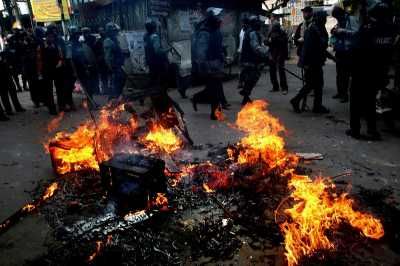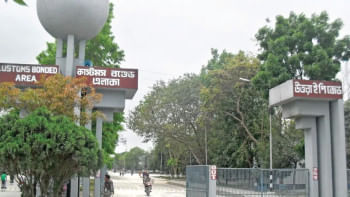Unreason's recent onrush

Photo: Munem Wasif/ Drik News
Critical thinking -- the ability or willingness to use reason -- is a trait that not many Bengalis can call their own. Unreason prevails. In this we Bengalis are not unique; but in any conceivable international index of unreason we will probably score high. This perhaps has always been so. Our brand of irrationality has something In common with our raging rivers, cyclones and tidal waves. More often, unreason has the numbing pervasiveness of the heat and humidity of an endless summer. Whatever the genre, though, there is little cause to doubt that the frequency of the manifestation of irrationality has been on the increase. Unlike the weather, we not only can talk about it, we must talk about it and perhaps can do something about it.
It is not easy to begin at the beginning. But take the case of the recent unrest in the garments industry. It caused an enormous amount of damage to the industry and the economy and great suffering to the workers themselves through lost income. It all started at a particular factory where an employee went missing. Foul play was instantly suspected and violent worker protest ensued. The "missing" person soon turned up for work and his disappearance turned out to be pure rumour. There was no reason for protest on this score. Still, passion took over. The protest soon took the form of demand for higher wages, bringing in an altogether different issue. The violence that followed had no rational basis either, though the demand for decent wages certainly had.
Still on the matter of violence, how many roads and highways are forcibly closed and vehicles smashed by mobs every year following traffic accidents that kill and maim? The vehicles involved in a fatal accident are often total wrecks and their drivers are often among the casualties. But the rage that often follows an accident consumes other vehicles which have nothing to do with the accident. Either they are smashed up too or their movement is halted, resulting in miles of misery in vehicles stuck in traffic gridlock. It is impossible to find a rationale for such action. Yet it is a common phenomenon on roads and highways of the country.
The irrationality of blockades and smashing up of vehicles following traffic accidents is often matched by the fuzziness of our understanding of why accidents happen in the first place. I ignore for a start the cynical view, expressed for example by a senior leader of the present party in power, that accidents are accidents and will happen, or that accidents happen in developed countries too. This is not to suggest that causes often cited are all flawed. But some certainly are. Road conditions, the age and state of maintenance of the vehicles are sometimes responsible for accidents. But they are not among the major causes of mishaps.
Most of the major accidents on our highways take the form of head-on collision and vehicle going off the road while overtaking another vehicle or trying to avoid an impending collision. The overriding consideration here is the attitude of the driver at the wheel -- his reason for driving at a certain speed, his judgment on whether he can safely overtake a vehicle, or his perception of the importance of road signs warning of danger, for example.
Rigorous training of drivers has been rightly emphasised, precisely to tackle situations like these. But the core of such training must be the development of an attitude that uses reason to the full. Contrast this with the reality in the country where driver's licences can be bought rather than earned through rigorous tests, or where a minister of government discounts educational qualification as prerequisite for getting a licence.
It must not be supposed that it is only the plebs, the rampaging garment workers or smashers of vehicles who fail to exercise reason. If that were true, the perpetrators of rampant violence in various educational campuses would be models of rational thinking. I am also reminded that journalists too can go berserk when protesting deaths of colleagues in traffic accidents. The elites of society, be they educated or not so educated, are often afflicted by the same disability. Take the recent case of parliamentarians of the country excoriating Professor Abdullah Abu Sayeed for his alleged remarks about members of parliament. Not a few of the lawmakers called for the scalp of the respected professor. It never occurred to them to verify the allegations, which turned out to be quite untrue. An uncritical acceptance of certain newspaper reports about what the professor said led to an ugly caricature in parliament that was fortunately ended by a final exercise of decency on the part of the deputy speaker.
It is evident that there are many kinds of irrationality. But high on the list should be acts of unreason that sometimes result from pure emotion or come dressed up as sweet reasonableness. Take, for example, the action of a group of intellectuals in the month of February this year, calling on the High Court to ban the use of incorrect Bangla. Yes, just ban bad Bangla. But, does such demand stand to reason? Evidently not. For one thing, there is no universally accepted standard against which the correctness of a piece of Bangla can be judged. Secondly, there is no way of enforcing the ban legally or otherwise. In calling for such a ban the intellectuals had embraced emotion and abandoned reason. There must be better ways of promoting the Bengali language and literature than through official fiat.
Talking of literature, can a court of justice reasonably decide what a piece of literary work should or should not look like? Courts in this country and elsewhere have a history of banning books. But I haven't heard of courts being asked to adjudicate whether a novel must be "true" to "facts" if the work is broadly based on historical reality -- until now.
Recently, the attorney-general of the country went to court to point out that a certain paragraph of a novel by the popular writer Humayun Ahmed does not correctly describe the scene of the horrific murder of the child Sheikh Russell, son of Bangabandhu Sheikh Mujibur Rahman. He wishes the novelist rather to follow the facts as recorded in the judgment in the Bangabandhu murder trial to describe the scene. I have always thought, in literature the reader is the ultimate judge, not justices of courts of law. The attorney-general felt the readers would get "wrong information" reading this part of the novel. In other words, he wants conformity, which is the very antithesis of critical thinking. He assumes readers of the novel cannot think for themselves, cannot tell fact from fiction, will necessarily take the novel for the bible, and fail to take the author to task if needed. In a society of rampant unreason, it is still unreasonable to demand conformity here.
Finally, of the various dimensions of conformity and unreason, try this one: I heard someone, who incidentally is a close relative of mine, say, tax is something we pay the government, but zakat is a tax we pay Allah. This, of course, is true, the latter not literally, though. But what the person was really doing was to emphasise the inferiority and unimportance of paying taxes to government. It never occurred to his uncritical mind that government would grind to a halt if it could not collect tax. He belongs to a certain mosque-centered movement, based on the strictest literal interpretation of Islam and total unacceptability of dissent.
Examples like the one about paying taxes can be multiplied many-fold. The important thing to note is that the teachings and propaganda of the group virtually shut out all rational thinking. They close the mind. I am certain very few members of the movement have ever heard of the days of historic Islam when reasoning was openly propagated even in matters of religion.
Years ago I wrote an essay in these pages called "Khoda Hafez versus Allah Hafez," which argued that there is no reason -- emphasis is on reason -- to make the transition from the traditional Khoda Hafez to Allah Hafez. I did not make many converts to my thinking, not even in my extended family.
Still, we must think, and reason.

 For all latest news, follow The Daily Star's Google News channel.
For all latest news, follow The Daily Star's Google News channel. 



Comments